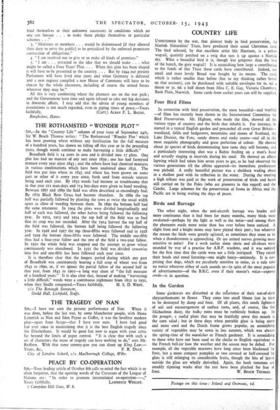THE ROTHAMSTED 4, WONDER PLOT "
Srn,—In the " Country Life " column of your issue of September 24th, Sir W. Beach Thomas writes : " The Rothamsted ' Wonder Plot' which has been growing wheat without any fertilisation for the full measure of a hundred years, has shown no falling off this year or in the preceding years, though weeds continue to make harvesting a little difficult."
Broadbalk field is Iq acres in area and is divided into i7 plots. One. plot has had no manure of any sort since 1839 ; one has had farmyard manure every year since 1843 ; and the others have had chemical manures in various combinations which have been unaltered since 1852. The field was put into wheat in 1843 and wheat has been grown on some part or other of it every year since, fresh seed from outside sources being used each year. By 1852 weeds had become so troublesome that in that year 211 man-days and 714 boy-days were given to hand weeding. Between 1867 and 1889 the field was often described as exceedingly foul. By 1879 Black Bent Grass had become abundant. In 1889 the top half was partially fallowed by planting the rows at twice the usual width apart to allow of weeding between them. In 1890 the bottom half had the same treatment. In 1904 the plots were divided longitudinally and half of each was fallowed, the other halves being Wowed the following year. In 1912, 1913 and 1914 the top half of the field was so foul that its crop was not recorded. After the 1914 harvest the top half of the field was fallowed, the bottom half being fallowed the following year. In 1926 and 1927 the top three-fifths were fallowed and in 1928 and 1929 the bottom three-fifths were fallowed. The middle one-fifth thus had a four-year fallow and the rest of the field a two-year fallow. In 1930 the whole field was cropped and the attempt to grow wheat continuously was abandoned. In 1931 the field was divided crosswise into five and one-fifth has been Mowed each year since.
It is therefore clear that the longest period during which any part of Broadbalk was continuously bearing a full crop of wheat was from 5843 to 189o, or, if we ignore the partial fallow of the second half in that year, from 1843 to 1905—a long way short of " the full measure of a hundred years." It is also clear that, instead of making " harvesting a little difficult," weeds were a continuous nightmare from 1852 to 1931, Guild Hall, Lichfield, Staffs.


























 Previous page
Previous page